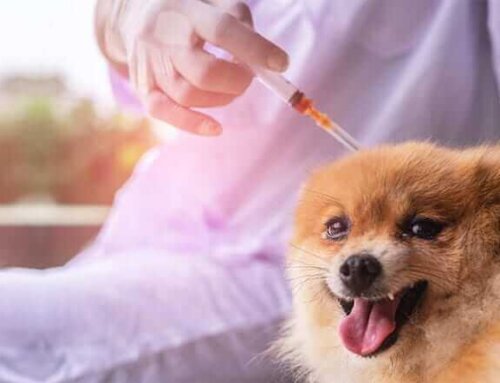Question: My vet put my diabetic dog on probiotic. Should my other dog also be on probiotic?
This may be a long answer! In general, probiotics are safe and do some amazing things in our bodies. There are several situations where we know that probiotics speed recovery and promote health in dogs and cats, but more studies need to be done to see if probiotics achieve the same health benefits in pets as they do in humans.
Just what are probiotics? The definition of probiotic by the World Health Organization is “live organisms that which when administered in adequate amounts confer a health benefit to the host”. In common language, these are the “good germs” that populate our GI-tract. If we have stress or go on antibiotics we can have tummy upset. A healthy gut flora helps us get through such situations without getting diarrhea. But the plot thickens… It turns out that a large portion of our immune system is in the GI-tract, and the benefits of probiotics is far more grand than cessation of diarrhea. (Of course if you do have the runs, speedy cessation of diarrhea is a joyous thing!) It turns out that being on probiotics can improve our immune defense to organs elsewhere in the body such as the urinary tract or respiratory tract. That’s pretty cool!
Next, let’s discuss a few basics about choosing a probiotic. Like many nutraceuticals, quality control is variable. Do the products actually offer what is featured on the label? You want to choose a reputable company to increase the odds that you are getting what is on the label! They may come in tablet form or powder form or even capsule form, but the importance is that the ingredients offer what is best for your pet. The probiotic needs to come in adequate numbers and survive the acid environment of the stomach so it can then colonize the GI-tract. And, you need to be able to get them into the pet!
For this reason, I carry several different probiotic products as pets can be finicky about how they will allow something of this nature to be administered. If your pet is not one that will swallow a tablet or capsule, powder form may be the best bet for him/her. I probably reach for Purina Fortiflora more than the others because it’s so darned easy to use as pets find it very tasty. Palatability especially matters for our feline patients. Fortiflora actually has 2 versions: dog probiotic (the good germs cultured from healthy dogs) and cat probiotic (the beneficial cat gi flora). It is sprinkled into whatever food the pet eats.
Since probiotics are live organisms, be sure to check the expiration date of the product you’re buying and don’t buy more than you will use before it expires. Compared to many products on a pharmacy shelf, these have a short shelf life! Don’t stock up far in advance as the longer it sits the fewer live organisms are likely present.
We should also touch briefly on prebiotics. Prebiotics are fibers that promote the growth of healthy bacteria in the gut. These fibers, especially fresh greens from the soil for humans, are often soluble fibers. Prebiotics may increase survival of probiotics. Your mom was right when she told you to eat your veggies!
Finally, let’s discuss situations where we know from science that probiotics will help our critters. More research has been done for humans and probiotics than with pets and probiotics, but we know that probiotics have shown to speed up resolution of acute diarrhea in dogs. Another study showed probiotic use can improve the response to vaccinations in puppies and kittens. Yet another study suggested that probiotics can help pets with kidney disease. The idea is that some bacteria can trap uremic toxins in the gastrointestinal tract, thereby using the gut for elimination of toxins rather than the kidneys.
I use a lot of probiotics in my clinic. Yes, the vast majority of my use of probiotic are cases of acute diarrhea. Whether diarrhea is from parasites or infection or just from Fluffy getting into the trash, they speed up resolution of acute diarrhea.
If I have a pet with chronic diarrhea, before sending a pet to a specialist for intestinal biopsy and fancy expensive diagnostics, I will use probiotics. I pride myself on practicality—I will give a broad spectrum de-wormer (even if fecal tests are negative) and a trial course of probiotic. I have several patients who had unexplained chronic diarrhea that I “cured” with probiotic! These owners are often afraid to take the pets off the probiotic. As probiotics are generally very safe, I’m happy for them to continue the use long term.
If your pet goes on antibiotic there is good chance of tummy upset or loose stool by the end of the course. Be proactive and start a probiotic at the start of the antibiotic medication! Boarding or other stressful event such as pet shows or travel would be a great time to proactively start a probiotic too. Probiotics are probably warranted for pets with IBD or sensitive GI-tracts, for pets with chronic upper respiratory infections, and for pets prone to stress colitis and urinary tract infections.
How long should we use them depends on the reason we are using them—if for acute diarrhea from a dietary indiscretion we might only use them for a week. If it is for IBD or feline herpes (the most common upper respiratory disease in kitties) we would use it long term and daily. Have a chat with your vet if you think your pet would benefit from a probiotic.
NOTE: Consult your veterinarian to confirm that my recommendations are applicable for the health needs of your pet.













Can you please recommend 1 or 2 probiotics for my diabetic dog. He is 14 years old and good health. There are so many to choose from, all of them say they are the best for his needs. I have read descriptions and I’m having a problem choosing from all the ingredients. I don’t know the right combinations. Please help. Thank You
My 12 yr old female spayed indoor kitty: Her lab cholesterol was 235 (69-225). Should I be concerned? Her diet is 85% wet food. She is a happy kitty. Thank you. I enjoy your letters so very much.
Virginia (Ginny) J.